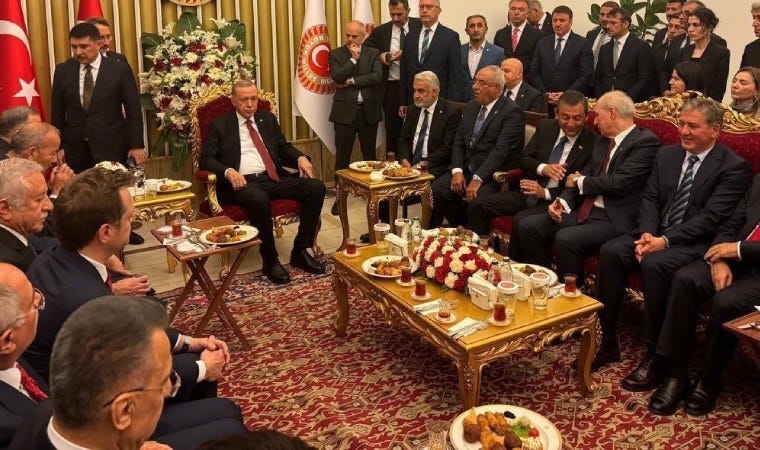This is a semi-regular feature in which I comment on the news in Turkey. The first sections of these posts are open to everyone and the later sections are behind the paywall.
Hi folks,
Apologies for my prolonged absence. It’s been an unusually busy time and I’m just clawing my back to normality.
This week I thought I’d write a bit about the “normalization” process, the arrests happening in the police force, and the education reform everyone’s talking about.
The question of normalization
Since CHP chairman Özgür Özel visited Erdoğan at AK Party headquarters, a lot of people have been talking about the possible “normalization” of Turkish politics. The proposition assumes that the extreme tension of Turkish politics is somewhat artificial, and that civil conduct between politicians can get the country back to a baseline of normality.
Some commentators have also been speculating that the alliance between the AK Party and MHP might be dissolved, that Erdoğan might release some or all of his political prisoners, and of course, that a peace process with the Kurds could again be in the cards.

I don’t want to be unkind, but I find it hard to take these kinds of comments seriously. Turkish politics isn’t tense because politicians aren’t being civil. It’s tense because the country is undergoing gradual, but deep regime change. The constitution has long been declared null and void. People no longer speak of an “Erdoğan government,” they speak of a “regime,” a massive network of formal and informal groups. The MHP isn’t really a “coalition partner,” it’s a major nod in a powerful network across the civil services, business, politics, and organized crime. The people at the top can’t just decide to dissolve these arrangements overnight and look for new coalition partners. This isn’t Belgium.
Why then, all this vacuous talk? For Özel, it’s an easy way to upstage Istanbul mayor Ekrem İmamoğlu and Ankara mayor Mansur Yavaş, as well as to position himself as the natural leader of the opposition. For Erdoğan, it’s a good way to deflate tension before announcing an austerity package. It’s also a nice thing to show international observers, since it does give an impression of regular parliamentary politics.
In the bowels of the state
Having said all that, there is something afoot. Just yesterday, three police officers were arrested. They apparently had ties to organized crime and were putting pressure on political figures. Social media is awash with talk about what religious orders these cops belonged to, and how all this is part of a vast internal struggle between various cliques within the government.
Minister of Interior Ali Yerlikaya recently said that they were investigating a conspiracy within the police. He likened this group to the infamous Gülenists (of putschist fame), and said that this group had been aiming to conduct a coup against the government. I don’t think Yerlikaya meant that there was literally a coup plot. He probably used that language to show that he had the full backing of the president.
Keep reading with a 7-day free trial
Subscribe to Kültürkampf to keep reading this post and get 7 days of free access to the full post archives.



